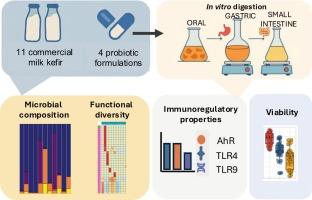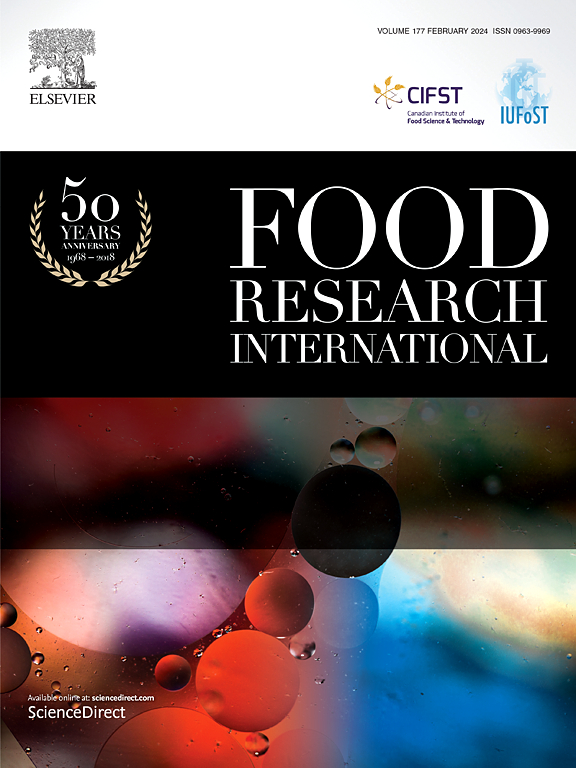商品牛奶开菲尔在体外人肠上皮模型上发挥tlr介导的免疫调节作用
IF 8
1区 农林科学
Q1 FOOD SCIENCE & TECHNOLOGY
引用次数: 0
摘要
人体肠道菌群在维持健康和体内平衡中起着至关重要的作用。开菲尔是一种传统的发酵饮料,被认为对健康有益,但其潜在的机制仍不完全清楚。本研究旨在研究11种商业开菲尔饮料的微生物组成、功能特征、活力和免疫调节特性,并与4种药物益生菌配方进行比较。在体外胃肠道消化前后对样品进行分析,并评估其对肠道免疫信号通路的影响,包括芳烃受体(AhR)、toll样受体4 (TLR4)和toll样受体9 (TLR9)。我们的研究结果揭示了开菲尔菌群的高度可变性,不同样品的细菌和真菌群落存在显著差异。真菌多样性、细菌多样性和免疫受体反应之间呈负相关,表明微生物-微生物相互作用在开菲尔的免疫调节潜能中起关键作用。开菲尔菌与药物益生菌之间的差异,特别是在TLR9调节方面的差异,突出了开菲尔菌独特的免疫调节作用。未来的研究应侧重于菌株特异性贡献、生物活性代谢物、食用开菲尔的长期健康影响以及乳基质-微生物元素相互作用的协同结果。本研究为进一步探索发酵食品在促进免疫平衡和肠道稳态方面的治疗潜力奠定了基础。本文章由计算机程序翻译,如有差异,请以英文原文为准。

Commercial milk kefir exerts immunomodulatory TLR-mediated responses on in vitro models of the human intestinal epithelium
The human gut microbiota plays a critical role in maintaining health and homeostasis. Kefir, a traditional fermented beverage, is recognized for its health benefits, yet the underlying mechanisms remain incompletely understood. This study aimed to investigate the microbial composition, functional profiles, viability, and immunomodulatory properties of 11 commercial kefir beverages compared to 4 pharmaceutical probiotic formulations. Samples were analyzed both before and after in vitro gastrointestinal digestion, and their effects on intestinal immune signaling pathways, including Aryl Hydrocarbon Receptor (AhR), Toll-like Receptor 4 (TLR4), and Toll-like Receptor 9 (TLR9), were assessed. Our findings revealed high variability in kefir microbiomes, with significant differences in bacterial and fungal communities across samples. A negative correlation was found between fungal diversity, bacterial diversity, and immune receptor responses, suggesting that microbe-microbe interactions play a key role in kefir's immunomodulatory potential. Differences between kefirs and pharmaceutical probiotics, particularly in TLR9 modulation, highlight the distinct immunoregulatory effects of kefir. Future research should focus on strain-specific contributions, bioactive metabolites, long-term health effects of kefir consumption and synergic outcomes derived from milk matrix-microbial elements interactions. This study provides a foundation for further exploration into the therapeutic potential of fermented foods in promoting immune balance and gut homeostasis.
求助全文
通过发布文献求助,成功后即可免费获取论文全文。
去求助
来源期刊

Food Research International
工程技术-食品科技
CiteScore
12.50
自引率
7.40%
发文量
1183
审稿时长
79 days
期刊介绍:
Food Research International serves as a rapid dissemination platform for significant and impactful research in food science, technology, engineering, and nutrition. The journal focuses on publishing novel, high-quality, and high-impact review papers, original research papers, and letters to the editors across various disciplines in the science and technology of food. Additionally, it follows a policy of publishing special issues on topical and emergent subjects in food research or related areas. Selected, peer-reviewed papers from scientific meetings, workshops, and conferences on the science, technology, and engineering of foods are also featured in special issues.
 求助内容:
求助内容: 应助结果提醒方式:
应助结果提醒方式:


